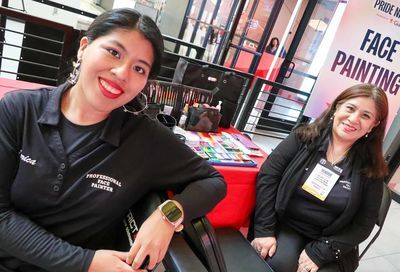Colonial Williamsburg adds LGBTQ reenactments as part of diversity initiative
Researcher says historical documents show LGBTQ people were more widely accepted in colonial times than previously assumed.

Colonial Williamsburg is bringing a small part of gay history to life in a special reenactment this fall, with the hope of adding additional LGBTQ programming in the future.
Starting in October, the immersive living-history museum where visitors can experience at what it would have been like to be alive in 18th century Virginia will feature a new musical called Ladies of Llangollen, based on diary entries, letters, and poetry of two women who ran away from Ireland and eloped in Wales during the 18th century — whose story attracted the attention of Queen Charlotte.
The introduction of LGBTQ content comes after two years during which researchers and historians have been looking through historical records to better understand the history of LGBTQ people living during the colonial period.
In 2019, the Colonial Williamsburg foundation created a Gender and Sexuality Diversity Committee with the purpose of researching the issue, trying to answer the question: “What is the Western population’s view on sexuality and gender and how did they determine who was a man and who was a woman?”
Initially, the goal of the committee was to conduct research, find examples, and create an internal guidebook for interpreters in order to better answer visitors’ questions, after several visitors had asked about the lives of LGBTQ people in colonial times.
“People ask. If they’re interested and want to know, we need to have an answer for it,” Ron Tolson, a researcher with the Gender and Sexuality Diversity Committee, told The Virginia Gazette last month.
According to Beth Kelly, the Colonial Williamsburg foundation’s vice president of education, research and historical interpretation, the proposal by researchers to create the committee was in line with the foundation’s goal of providing knowledge and telling a complete story of people during the colonial period.
“We’re very open to making sure that we look for all of the people that were here in the 18th century; those that were in the margins and those whose voices were not able to be recorded or not able to be voiced and bring them forward,” Kelly said.
Of course, there are complications involved with researching LGBTQ-related issues. For example, many of the documents uncovered by the committee are written in a sort of coded language that researchers have to recognize in order to understand it. Additionally, numerous courthouse fires that occurred between the 17th and 18th centuries means that some historical documents that may have contained additional stories were lost. So Tolson’s research focuses primarily on cases specific to Virginia and Western Europe that would have heavily influenced colonists.
But when the committee began researching LGBTQ history, Tolson noted, researchers found multiple instances of lesbian and transgender people in the early years of America’s founding. In fact, he said, the research indicates LGBTQ people were more widely accepted than traditionally thought, especially following a mini-sexual revolution that occurred in Western Europe in the 1740s.
One example of an LGBTQ story was told by a pair of marriage license requests the committee found. According to the documents, an affluent landowning Virginia woman filed a marriage license to be wed to a woman who worked at her post office. The license was denied, citing that marriages were solely between a man and a woman. But the following day, the woman returned, dressed in traditionally male clothing and sporting a short haircut. Her marriage license was subsequently granted.
Another example was the case of an indentured servant named Thomas Hall, originally born Thomasine in England. At age 22, Hall joined the British Army and presented as male, enlisting under the name Thomas. When they moved to Virginia, Hall lived as both a man and a woman, wearing men’s and women’s clothes — something that directly went against English societal norms. After Hall’s neighbors were alerted to their gender-breaking behavior and style of dress, a trial ensued, with the court ruling that Hall was both a man and a woman.
Additionally, Tolson told The Gazette, there were numerous LGBTQ forms of popular culture media that were shared in the colonies. One example was the British novel, Fanny Hill: Memoirs of a Woman of Pleasure, which details multiple romantic relationships of two women, and was sold in post offices and shops across Western Europe and the colonies, including Williamsburg.
“This was a book made for mass consumption,” Tolson says of the novel. “This wasn’t just a piece for one specific group but for everyone.”
Kelly, of the Colonial Williamsburg foundation, says that as more history is discovered, additional programs and reenactments incorporating those stories will be introduced, starting with the Ladies of Llangollen this fall.
Tolson compared delving through LGBTQ history to researching other marginalized groups like indigenous or enslaved people.
“It’s not that the information isn’t there, it’s that it hasn’t been properly researched and a lot of other groups are overrepresented in the historic record,” he said.
See also:
Tennessee wedding venue turns away gay couple due to owner’s “religious beliefs”
Teacher removed from class after joke about pledging allegiance to Pride flag
Support Metro Weekly’s Journalism
These are challenging times for news organizations. And yet it’s crucial we stay active and provide vital resources and information to both our local readers and the world. So won’t you please take a moment and consider supporting Metro Weekly with a membership? For as little as $5 a month, you can help ensure Metro Weekly magazine and MetroWeekly.com remain free, viable resources as we provide the best, most diverse, culturally-resonant LGBTQ coverage in both the D.C. region and around the world. Memberships come with exclusive perks and discounts, your own personal digital delivery of each week’s magazine (and an archive), access to our Member's Lounge when it launches this fall, and exclusive members-only items like Metro Weekly Membership Mugs and Tote Bags! Check out all our membership levels here and please join us today!























You must be logged in to post a comment.